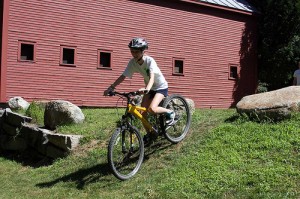 With the Center for Disease Control and Prevention (CDC) reporting that nearly 1 in 5 children between the ages of 6 and 19 is obese, it has become imperative that we, as parents, make as much effort to set our children up for success in establishing proper food habits, just as we would in other areas of their lives. Three primary causes consistently cited for childhood obesity are lack of physical activity, an unbalanced diet and overeating. An often overlooked benefit to summer camp is the significant impact it has in curbing childhood obesity by promoting an active lifestyle and healthy eating practices. In this multi-part series, we will examine the efforts being made by summer camps to battle poor diet and exercise.
With the Center for Disease Control and Prevention (CDC) reporting that nearly 1 in 5 children between the ages of 6 and 19 is obese, it has become imperative that we, as parents, make as much effort to set our children up for success in establishing proper food habits, just as we would in other areas of their lives. Three primary causes consistently cited for childhood obesity are lack of physical activity, an unbalanced diet and overeating. An often overlooked benefit to summer camp is the significant impact it has in curbing childhood obesity by promoting an active lifestyle and healthy eating practices. In this multi-part series, we will examine the efforts being made by summer camps to battle poor diet and exercise.
Part I. Physical Activity
Beyond traditional summer camp sports such as soccer, basketball, baseball, roller hockey and 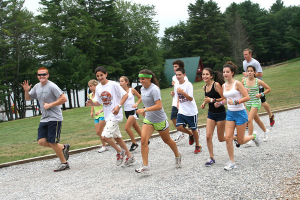 gymnastics, many camps are increasingly focusing on the development of extensive programs for such popular fitness activities as spin, running, weights, zumba, yoga and the martial arts. The instant popularity of these programs suggests that children have a natural interest in exercise and will engage in it of their own accord in the absence of many of the daily distractions that promote a more lethargic lifestyle but are not readily available at summer camp, such as computers, video game systems and television. The ability to participate in fitness programs as a form of fun also encourages campers to approach such activities with an open mind rather than as something forced on them and that is only done out of necessity.
gymnastics, many camps are increasingly focusing on the development of extensive programs for such popular fitness activities as spin, running, weights, zumba, yoga and the martial arts. The instant popularity of these programs suggests that children have a natural interest in exercise and will engage in it of their own accord in the absence of many of the daily distractions that promote a more lethargic lifestyle but are not readily available at summer camp, such as computers, video game systems and television. The ability to participate in fitness programs as a form of fun also encourages campers to approach such activities with an open mind rather than as something forced on them and that is only done out of necessity.
Some camps are also experimenting with nutrition programs that marry cooking activities with fitness. Such programs teach campers how to plan healthy meals and snacks and then prepare them. Cooking programs are among the most popular at summer camp. To merge them with nutrition is a clever way to demonstrate the importance of using discretion in choosing what we eat and consuming it in moderation. In the past, the idea of “diet,” as in depriving oneself of necessary nutrients, has been cited as a contributing factor in the growth of eating disorders and yo-yo dieting.
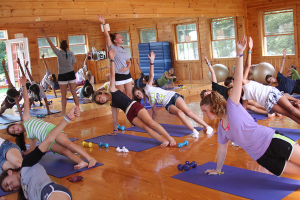 For those who question the lasting effects of fitness and nutritional habits adapted at summer camp, statistics indicate that they won’t be going away anytime soon. According to the American Camp Association, more than half of children who pursue a new interest at camp will continue pursuing that interest once they return home.
For those who question the lasting effects of fitness and nutritional habits adapted at summer camp, statistics indicate that they won’t be going away anytime soon. According to the American Camp Association, more than half of children who pursue a new interest at camp will continue pursuing that interest once they return home.
Up next, part II. An Unbalanced Diet


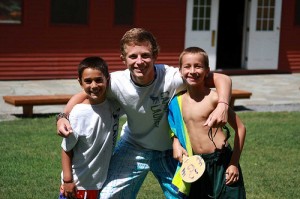
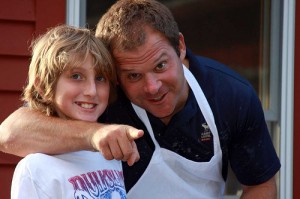
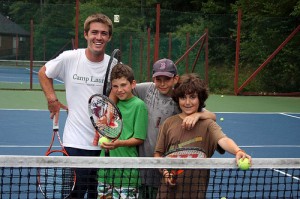
 When I think about “camp songs,” I immediately think about singing around campfires, but each year at camp also has a distinct popular music soundtrack. Recently, campers weighed in on Twitter about the tunes that remind them of past summers and that got me thinking about what the United States and camp was like in the 1960s and 1970s.
When I think about “camp songs,” I immediately think about singing around campfires, but each year at camp also has a distinct popular music soundtrack. Recently, campers weighed in on Twitter about the tunes that remind them of past summers and that got me thinking about what the United States and camp was like in the 1960s and 1970s.
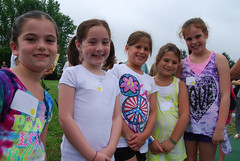
 While no actual human being develops in the precise
While no actual human being develops in the precise  As children mature, they continue to develop and require more experiences where they can make independent choices without parents. If parents don’t allow children to make decisions and do things on their own, they won’t develop confidence or realize that they are not just extensions of their caregivers. It’s a tricky line that parents walk! Sometimes giving child
As children mature, they continue to develop and require more experiences where they can make independent choices without parents. If parents don’t allow children to make decisions and do things on their own, they won’t develop confidence or realize that they are not just extensions of their caregivers. It’s a tricky line that parents walk! Sometimes giving child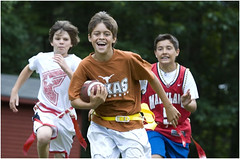
 Of course, the
Of course, the 
 The ways in which children understand and experience nature has changed beyond recognition for Americans born during the last two decades. While children today may be more aware of the global threats to our larger environment, they are much less aware of their immediate natural surroundings. As children, Louv and his peers may not have discussed global warming, or holes in the ozone layer, but they loved “their woods” and fields intimately and felt connected to the people and their location in the world. They identified specific bends and crooks in creeks and holes in backyards—explored the woods in solitude, lay in fields listening to the wind and marveled at clouds shape-shifting overhead.
The ways in which children understand and experience nature has changed beyond recognition for Americans born during the last two decades. While children today may be more aware of the global threats to our larger environment, they are much less aware of their immediate natural surroundings. As children, Louv and his peers may not have discussed global warming, or holes in the ozone layer, but they loved “their woods” and fields intimately and felt connected to the people and their location in the world. They identified specific bends and crooks in creeks and holes in backyards—explored the woods in solitude, lay in fields listening to the wind and marveled at clouds shape-shifting overhead. Louv discovered that
Louv discovered that 
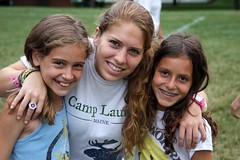
 …do a flip off the Mini-Tramp.
…do a flip off the Mini-Tramp. … flop in the lake…
… flop in the lake…